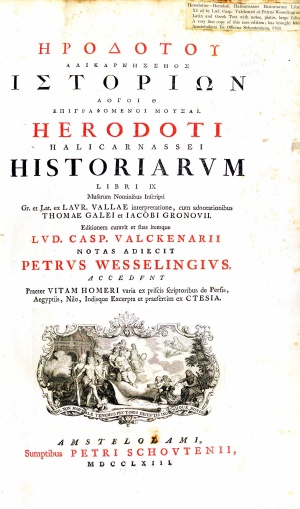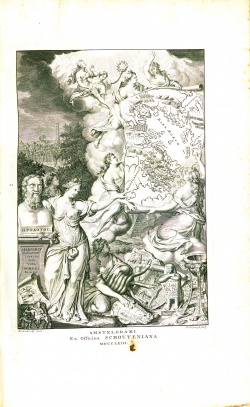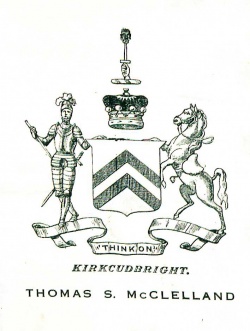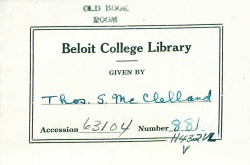Difference between revisions of "Hērodotou Halikarnēssēos Historiōn Logoi 9 Epigraphomenoi Mousai"
| Line 1: | Line 1: | ||
{{DISPLAYTITLE:''Hērodotou Halikarnēssēos Historiōn Logoi 9 Epigraphomenoi Mousai''}} | {{DISPLAYTITLE:''Hērodotou Halikarnēssēos Historiōn Logoi 9 Epigraphomenoi Mousai''}} | ||
| + | <big>''Hērodotou Halikarnēssēos Historiōn Logoi 9 Epigraphomenoi Mousai = Herodoti Halicarnassei Historiarum Libri IX Musarum Nominibus Inscripti''</big> | ||
===by Herodotus=== | ===by Herodotus=== | ||
__NOTOC__ | __NOTOC__ | ||
| Line 5: | Line 6: | ||
|imagename=HerodotusHerodotiHalicarnasseiHistoriarum1763.jpg | |imagename=HerodotusHerodotiHalicarnasseiHistoriarum1763.jpg | ||
|link=https://catalog.swem.wm.edu/law/Record/3623428 | |link=https://catalog.swem.wm.edu/law/Record/3623428 | ||
| − | |shorttitle=Hērodotou Halikarnēssēos Historiōn Logoi 9 Epigraphomenoi Mousai | + | |shorttitle=Hērodotou Halikarnēssēos Historiōn Logoi 9 Epigraphomenoi Mousai |
|author=Herodotus | |author=Herodotus | ||
| − | |lang=Greek | + | |editor=Lodewijk Caspar Valckenaer, with notes of Petrus Wesseling |
| + | |lang=Greek and Latin in parallel columns | ||
|publoc=Amstelodami | |publoc=Amstelodami | ||
|publisher=Sumptibus Petri Schoutenii | |publisher=Sumptibus Petri Schoutenii | ||
|year=1763 | |year=1763 | ||
| − | + | |pages=26], 868, 177, [69] | |
| − | Herodotus was the first Greek historian, and perhaps the first true historian (who committed history to writing) in the world. Born in Halicarnassus (an Ancient Greek city in present-day Turkey on the Aegean Sea), Herodotus wrote during the third quarter of the fifth century BCE. He, and Thucydides following him shortly after, embraced the systematic approach of true ''historia'', meaning inquiry, observation and research of events and people. Though his methods were still in the early, untested stages which would be greatly improved upon by more modern historians, Herodotus began a crucial intellectual endeavor for which Ancient Greece became known. <ref>G.E.M. De Ste. Croix, “Herodotus,” ''Greece & Rome'', Second Series 24, no. 2 (Oct. 1977): 130-31.</ref><br/> | + | |desc=Folio (43 cm.) |
| + | }}[[File:HerodotusHerodotiHalicarnasseiHistoriarum1763HalfTitle.jpg|left|thumb|250px|<center>Half-title.</center>]][http://en.wikipedia.org/wiki/Herodotus Herodotus] (c. 484 BCE–425 BCE) was the first Greek historian, and perhaps the first true historian (who committed history to writing) in the world. Born in Halicarnassus (an Ancient Greek city in present-day Turkey on the Aegean Sea), Herodotus wrote during the third quarter of the fifth century BCE. He, and Thucydides following him shortly after, embraced the systematic approach of true ''historia'', meaning inquiry, observation and research of events and people. Though his methods were still in the early, untested stages which would be greatly improved upon by more modern historians, Herodotus began a crucial intellectual endeavor for which Ancient Greece became known. <ref>G.E.M. De Ste. Croix, “Herodotus,” ''Greece & Rome'', Second Series 24, no. 2 (Oct. 1977): 130-31.</ref><br/> | ||
<br/>Now considered one of the foundational books of history, Herodotus’s ''Histories'', or ''The History'', was originally criticized and discounted by his peers. His anthropological approach to history was much less desired than more strictly political works. Analyzing the importance of culture in key historical events, Herodotus’s work fell to the wayside behind the “sharper but narrower political historiography of [his contemporary] Thucydides.” <ref>Carl E. Schorske, “History and the Study of Culture,” ''New Literary History'' 21, no. 2 (Winter 1990): 409.</ref> | <br/>Now considered one of the foundational books of history, Herodotus’s ''Histories'', or ''The History'', was originally criticized and discounted by his peers. His anthropological approach to history was much less desired than more strictly political works. Analyzing the importance of culture in key historical events, Herodotus’s work fell to the wayside behind the “sharper but narrower political historiography of [his contemporary] Thucydides.” <ref>Carl E. Schorske, “History and the Study of Culture,” ''New Literary History'' 21, no. 2 (Winter 1990): 409.</ref> | ||
| − | + | {{BookPageBookplate | |
| − | ==Evidence for Inclusion in Wythe's Library== | + | |imagename=HerodotusHerodotiHalicarnasseiHistoriarum1763BookplateFPD.jpg |
| − | Listed in the [[Jefferson Inventory]] of [[Wythe's Library]] as "Herodotus Gronovii. Gr. Lat. fol." and given by [[Thomas Jefferson]] to his grandson [[Thomas Jefferson Randolph]]. The [https://digitalarchive.wm.edu/handle/10288/13433 Brown Bibliography]<ref> Bennie Brown, "The Library of George Wythe of Williamsburg and Richmond," (unpublished manuscript, May, 2012) Microsoft Word file. Earlier edition available at: https://digitalarchive.wm.edu/handle/10288/13433</ref> lists the 1763 edition published in Amersterdam while [http://www.librarything.com/profile/GeorgeWythe George Wythe's Library]<ref>''LibraryThing'', s. v. "Member: George Wythe, | + | |display=left |
| − | + | |caption=Bookplate of Thomas S. McClelland, front pastedown. | |
| − | ==Description of the Wolf Law Library's copy== | + | }}==Evidence for Inclusion in Wythe's Library== |
| − | Bound in full period leather binding with new spine in speckled calf | + | Listed in the [[Jefferson Inventory]] of [[Wythe's Library]] as "Herodotus Gronovii. Gr. Lat. fol." and given by [[Thomas Jefferson]] to his grandson [[Thomas Jefferson Randolph]]. The [https://digitalarchive.wm.edu/handle/10288/13433 Brown Bibliography]<ref> Bennie Brown, "The Library of George Wythe of Williamsburg and Richmond," (unpublished manuscript, May, 2012) Microsoft Word file. Earlier edition available at: https://digitalarchive.wm.edu/handle/10288/13433</ref> lists the 1763 edition published in Amersterdam while [http://www.librarything.com/profile/GeorgeWythe George Wythe's Library]<ref>''LibraryThing'', s. v. [http://www.librarything.com/profile/GeorgeWythe "Member: George Wythe"], accessed on April 21, 2013.</ref> on LibraryThing states "Precise edition unknown. Several folio editions were published." The Wolf Law Library followed Brown's recommendation and purchased the edition published in Amsterdam in 1763. |
| + | {{BookPageBookplate | ||
| + | |imagename=HerodotusHerodotiHalicarnasseiHistoriarum1763BookplateFFEP.jpg | ||
| + | |display=left | ||
| + | |caption=Bookplate of Beloit College Library, front free endpaper. | ||
| + | }}==Description of the Wolf Law Library's copy== | ||
| + | Bound in full period leather binding with new spine in speckled calf. Red morocco label with gilt lettering on spine. All edges stained red. Contains the bookplate of Thomas S. McClelland on the front pastedown and that of Beloit College Library on the front free endpaper. Purchased from Rose's Books. | ||
View this book in [https://catalog.swem.wm.edu/law/Record/3623428 William & Mary's online catalog.] | View this book in [https://catalog.swem.wm.edu/law/Record/3623428 William & Mary's online catalog.] | ||
| − | |||
| − | |||
| − | |||
==References== | ==References== | ||
<references/> | <references/> | ||
| + | |||
| + | ==External Links== | ||
| + | Read this book in [http://books.google.com/books?id=o_xAAAAAcAAJ&printsec=frontcover Google Books]. | ||
[[Category:Ancient History]] | [[Category:Ancient History]] | ||
[[Category:George Wythe Collection at William & Mary's Wolf Law Library]] | [[Category:George Wythe Collection at William & Mary's Wolf Law Library]] | ||
[[Category:Titles in Wythe's Library]] | [[Category:Titles in Wythe's Library]] | ||
Revision as of 13:34, 19 February 2014
Hērodotou Halikarnēssēos Historiōn Logoi 9 Epigraphomenoi Mousai = Herodoti Halicarnassei Historiarum Libri IX Musarum Nominibus Inscripti
by Herodotus
| Hērodotou Halikarnēssēos Historiōn Logoi 9 Epigraphomenoi Mousai | |
|
Title page from Hērodotou Halikarnēssēos Historiōn Logoi 9 Epigraphomenoi Mousai, George Wythe Collection, Wolf Law Library, College of William & Mary. | |
| Author | Herodotus |
| Editor | Lodewijk Caspar Valckenaer, with notes of Petrus Wesseling |
| Published | Amstelodami: Sumptibus Petri Schoutenii |
| Date | 1763 |
| Language | Greek and Latin in parallel columns |
| Pages | 26], 868, 177, [69] |
| Desc. | Folio (43 cm.) |
Now considered one of the foundational books of history, Herodotus’s Histories, or The History, was originally criticized and discounted by his peers. His anthropological approach to history was much less desired than more strictly political works. Analyzing the importance of culture in key historical events, Herodotus’s work fell to the wayside behind the “sharper but narrower political historiography of [his contemporary] Thucydides.” [2]
Evidence for Inclusion in Wythe's Library
Listed in the Jefferson Inventory of Wythe's Library as "Herodotus Gronovii. Gr. Lat. fol." and given by Thomas Jefferson to his grandson Thomas Jefferson Randolph. The Brown Bibliography[3] lists the 1763 edition published in Amersterdam while George Wythe's Library[4] on LibraryThing states "Precise edition unknown. Several folio editions were published." The Wolf Law Library followed Brown's recommendation and purchased the edition published in Amsterdam in 1763.
Description of the Wolf Law Library's copy
Bound in full period leather binding with new spine in speckled calf. Red morocco label with gilt lettering on spine. All edges stained red. Contains the bookplate of Thomas S. McClelland on the front pastedown and that of Beloit College Library on the front free endpaper. Purchased from Rose's Books.
View this book in William & Mary's online catalog.
References
- ↑ G.E.M. De Ste. Croix, “Herodotus,” Greece & Rome, Second Series 24, no. 2 (Oct. 1977): 130-31.
- ↑ Carl E. Schorske, “History and the Study of Culture,” New Literary History 21, no. 2 (Winter 1990): 409.
- ↑ Bennie Brown, "The Library of George Wythe of Williamsburg and Richmond," (unpublished manuscript, May, 2012) Microsoft Word file. Earlier edition available at: https://digitalarchive.wm.edu/handle/10288/13433
- ↑ LibraryThing, s. v. "Member: George Wythe", accessed on April 21, 2013.
External Links
Read this book in Google Books.



